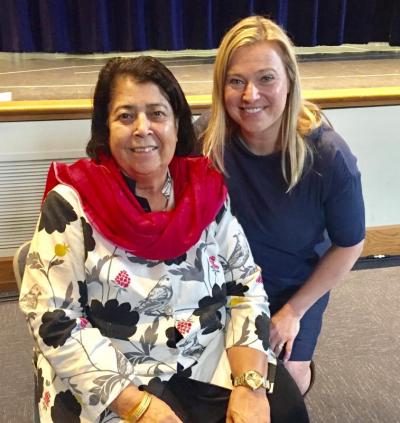Students learn about human rights from world-renowned advocate
Friends Academy hosts about 250 preschool through eighth grade students, and costs around $25,000 each year. Education is a priority here.
So it was surprising to students to learn that a 10-year-old school was the first in one Afghan village to allow girls an education. Students met Razia Jan, founder of the Zabuli Education Center, on May 2.
Jan is a CNN Top Ten Hero, a 20-year Rotarian, honoree of numerous awards, and the subject of the PBS documentary, "What Tomorrow Brings." The documentary was filmed by Friends Academy parent, Beth Murphy.
In the Tucker Road school's auditorium, students watched a short clip following Yalda, an Afghan girl who went through Jan's school, graduated, and is pursuing a nursing degree despite getting married at 14 years old. Students then asked Jan and Murphy about the school, life overseas, and the documentary.
"It's very unusual for a girl to be engaged and be able to go to school," explained Murphy, who followed Yalda's story from fifth through nineth grade. Yalda is now 19 years old.
Jan explained that growing up in Afghanistan, she always felt the equal of men, but upon returning from her studies in the United States, she found that things had changed. Within about 40 years, Afghanistan had seen a Russian invasion, civil war, and the Taliban. Women and girls were no longer equals, so with $120,000 raised by her Rotarian peers, she opened a school in the village of Deh' Subz in 2008.
"Education is something amazing that makes you understand yourself, makes you understand others, makes you understand your rights and how to behave, and how to be kind," said Jan.
Since then, the school's enrollment has grown from 109 students to 600 students. While it originally serviced kindergarten through fourth grade students, it now runs through twelfth grade.
The staggering numbers stuck with Friends Academy fourth grader Wilson Morrisey. "It was extremely moving. The fact that girls didn't really get to live their life fully... I'm really impressed with Razia. That was a big step for girls," he said following the discussion.
The lifestyle differences stuck more so with fourth grader Ella Friedman. "It's very weird to us that [Yalda] got engaged at 14 [to her mother's cousin]," she said.
The guest speakers explained that while there are differences between the Afghan and American culture — including the lack of play dates, no electricity in the houses, and students learn four languages (two of which are regional dialects) — similarities do exist.
"Winter is a lot of snow, and summer is very hot. Spring is beautiful like Massachusetts," said Jan. "Kids are the same, and you give them the same kind of education," she continued.
The materials might be different, but that doesn't necessarily matter, said Jan. Three hundred dollars will cover all of a student's expenses for a year, she said. (Donate at RaziasRayofHope.org.)
"We try to give them the best we can," she continued.
The guest speaker tied into students' human rights and advocacy lessons, and fourth grader Calvin Colby was quick to make the connection.
"Everyone's equal, and they should have the same chances for opportunities," he said.
Peer Addison Moura agreed: "Now they know it might be safer [for girls] if they know more because they can keep themselves safe."
During the discussion, Jan had explained that there are dangers for Afghan women that don't necessarily exist for men. It is the cultural norm to keep women and girls safe by limiting them to the home, she said.
The documentary aired on PBS in October 2016, but it will available online for free streaming this month, said Murphy. Visit PBS.org for more information.
What Tomorrow Brings Official Trailer from Principle Pictures on Vimeo.












